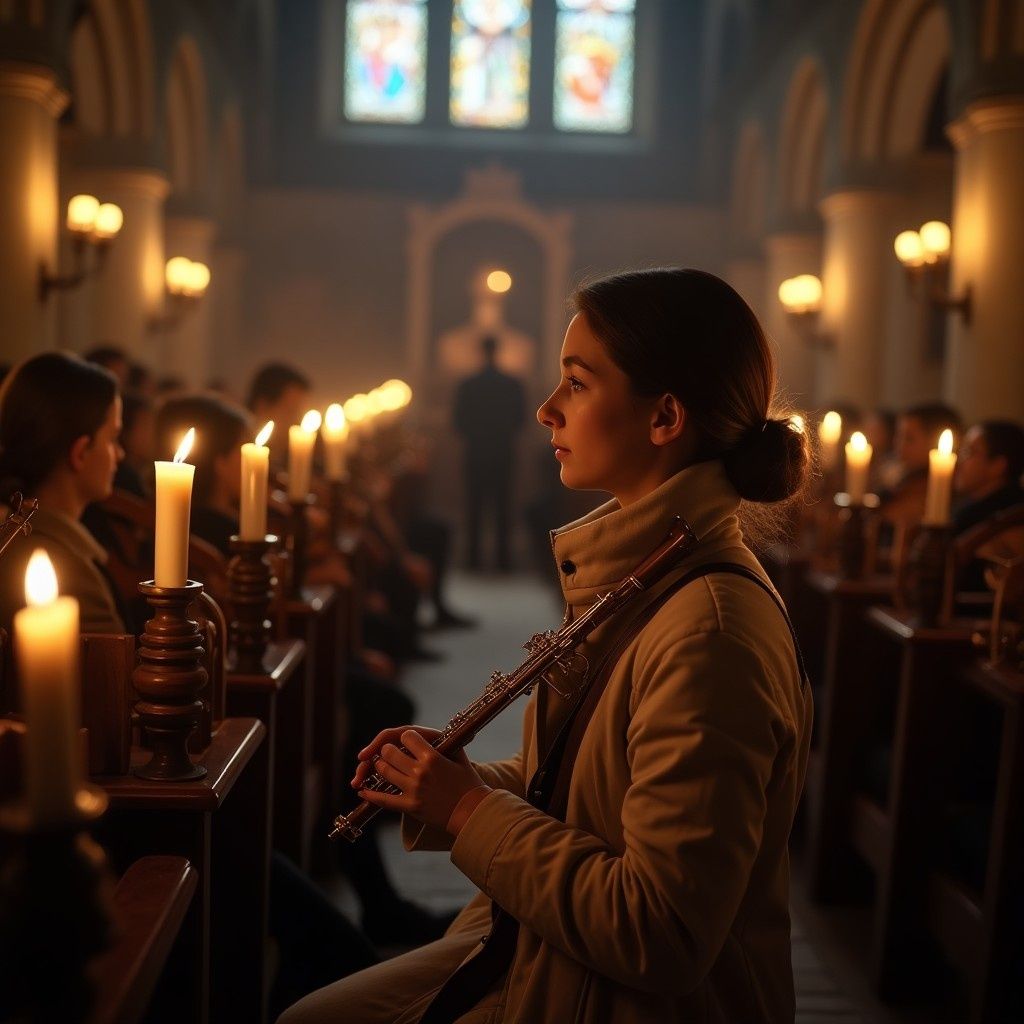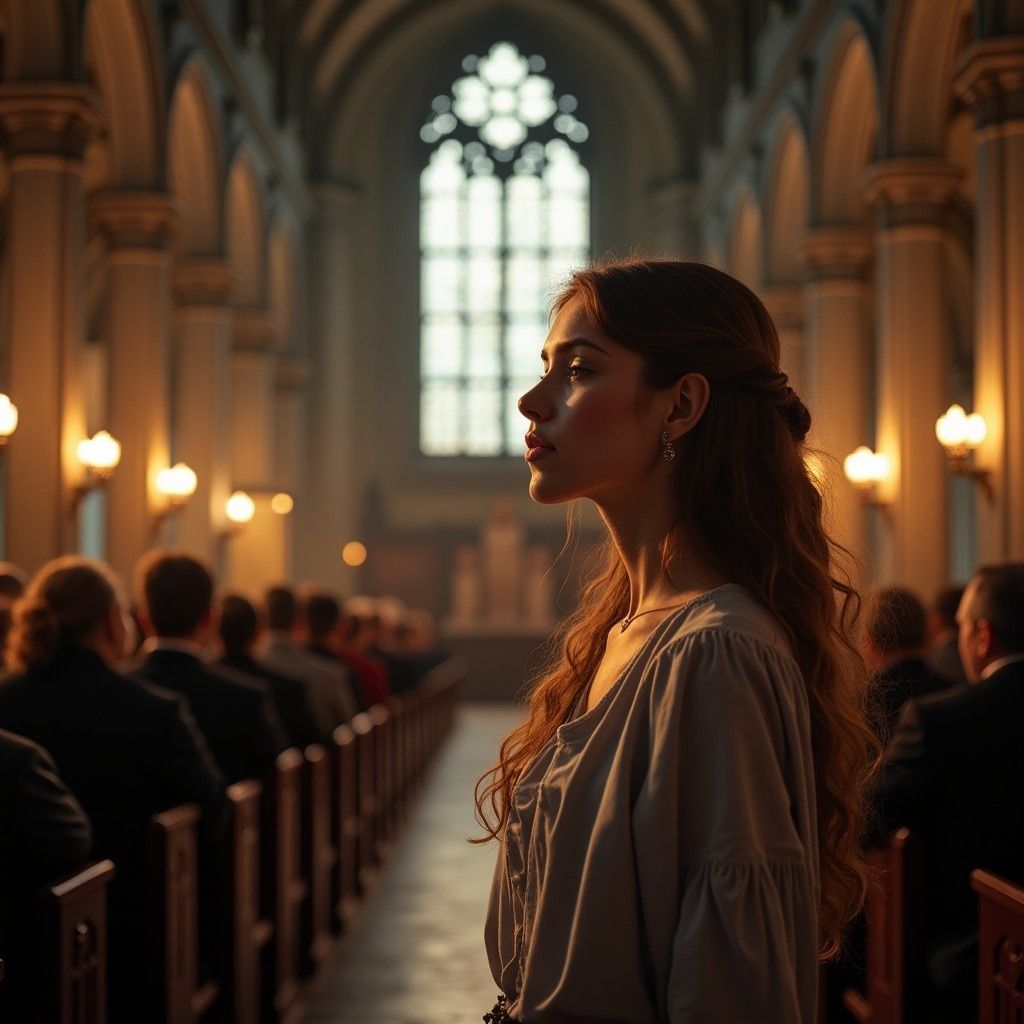In the dim glow of early dawn, the city of Leipzig stirred with the quiet anticipation of a new year. Snow blanketed the cobblestone streets, muffling the footsteps of those making their way to the Thomaskirche. Among them was a young woman named Clara, her breath visible in the crisp morning air, her heart beating with a mixture of excitement and trepidation.

Clara had been waiting for this day, the Feast of Epiphany, with bated breath. It was not just another service; it was the premiere of Johann Sebastian Bach's new cantata, "Sie werden aus Saba alle kommen." The music, she had heard, was unlike anything else, a tapestry of sound that promised to lift the soul. As she entered the church, the warmth enveloped her, and the familiar scent of incense filled her senses. She found a seat near the front, her eyes drawn to the musicians tuning their instruments, the horns gleaming under the candlelight, the recorders and oboes da caccia poised for the symphony to come.

Bach himself stood at the organ, his presence commanding yet serene. His fingers moved deftly over the keys, weaving a prelude that echoed through the nave, a gentle call to worship that settled over the congregation like a benediction. The cantata began, and Clara felt the music wash over her, each note a brushstroke painting the story of the Wise Men journeying from the East. The horns heralded their arrival, triumphant and bold, while the recorders whispered of the humble gifts they bore. The oboes da caccia sang of spiritual richness, a melody that danced between heaven and earth. Clara closed her eyes, letting the music guide her thoughts. She imagined the Wise Men, weary yet resolute, their eyes fixed on the star that led them to the Christ child. She saw their reverence, their awe, as they knelt before the manger, offering not just gold, frankincense, and myrrh, but their very hearts.

As the choir's voices soared, Clara felt a stirring within her own heart. The text spoke of offering one's heart to Christ, a gift more precious than any earthly treasure. It was a call to humility, to devotion, to a life lived in service to something greater than oneself. In that moment, Clara understood the true meaning of the cantata. It was not just a celebration of the Epiphany, but a reminder of the divine within the mundane, the sacred within the everyday. It was a call to live with intention, to offer one's life as a testament to faith and love. As the final notes faded into silence, Clara opened her eyes, her soul alight with newfound clarity. Around her, the congregation began to stir, murmurs of appreciation and wonder filling the air. But Clara remained seated, her heart full, her spirit lifted. Bach's music had woven its magic, transforming the ordinary into the extraordinary, the temporal into the eternal. And as Clara rose to leave, she carried with her the memory of that morning, a reminder of the power of music to touch the soul and change the heart.

Clara had been waiting for this day, the Feast of Epiphany, with bated breath. It was not just another service; it was the premiere of Johann Sebastian Bach's new cantata, "Sie werden aus Saba alle kommen." The music, she had heard, was unlike anything else, a tapestry of sound that promised to lift the soul. As she entered the church, the warmth enveloped her, and the familiar scent of incense filled her senses. She found a seat near the front, her eyes drawn to the musicians tuning their instruments, the horns gleaming under the candlelight, the recorders and oboes da caccia poised for the symphony to come.

Bach himself stood at the organ, his presence commanding yet serene. His fingers moved deftly over the keys, weaving a prelude that echoed through the nave, a gentle call to worship that settled over the congregation like a benediction. The cantata began, and Clara felt the music wash over her, each note a brushstroke painting the story of the Wise Men journeying from the East. The horns heralded their arrival, triumphant and bold, while the recorders whispered of the humble gifts they bore. The oboes da caccia sang of spiritual richness, a melody that danced between heaven and earth. Clara closed her eyes, letting the music guide her thoughts. She imagined the Wise Men, weary yet resolute, their eyes fixed on the star that led them to the Christ child. She saw their reverence, their awe, as they knelt before the manger, offering not just gold, frankincense, and myrrh, but their very hearts.

As the choir's voices soared, Clara felt a stirring within her own heart. The text spoke of offering one's heart to Christ, a gift more precious than any earthly treasure. It was a call to humility, to devotion, to a life lived in service to something greater than oneself. In that moment, Clara understood the true meaning of the cantata. It was not just a celebration of the Epiphany, but a reminder of the divine within the mundane, the sacred within the everyday. It was a call to live with intention, to offer one's life as a testament to faith and love. As the final notes faded into silence, Clara opened her eyes, her soul alight with newfound clarity. Around her, the congregation began to stir, murmurs of appreciation and wonder filling the air. But Clara remained seated, her heart full, her spirit lifted. Bach's music had woven its magic, transforming the ordinary into the extraordinary, the temporal into the eternal. And as Clara rose to leave, she carried with her the memory of that morning, a reminder of the power of music to touch the soul and change the heart.
Johann Sebastian Bach composed the church cantata "Sie werden aus Saba alle kommen" (BWV 65) in 1724 for the Feast of Epiphany, marking the conclusion of his first Christmas season as Thomaskantor in Leipzig. First performed on January 6, 1724, the cantata integrates scriptural readings from Isaiah and Matthew, reflecting on the prophecy of the Wise Men from the East bringing gifts to Jesus. The text, possibly by the same anonymous author who wrote for other Christmas cantatas, emphasizes the Christian duty to offer one's heart as a gift to Christ. Bach's composition features a festive orchestration with horns, recorders, and oboes da caccia, highlighting the contrast between spiritual richness and earthly humility. This cantata not only showcases Bach's mastery in blending theological themes with musical artistry but also enriches the liturgical celebration of Epiphany with its intricate and evocative musical structure.


Comments
Post a Comment